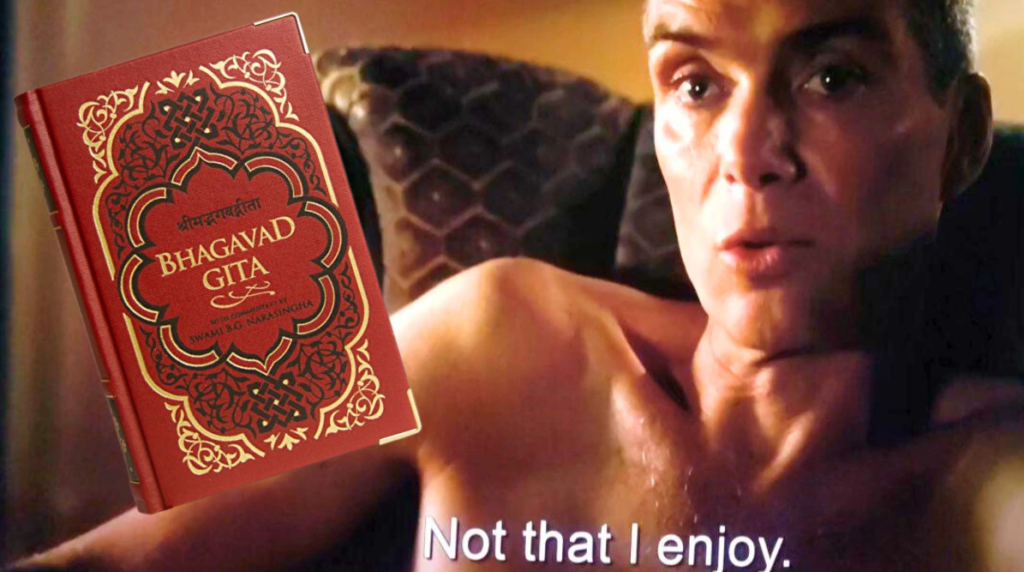Exploring the Bhagavad Gita Controversy in Oppenheimer: A Critical Analysis

Unraveling the Bhagavad Gita Controversy in Oppenheimer
The recently released film “Oppenheimer,” directed by Christopher Nolan and featuring Cillian Murphy as the titular character, has sparked heated debates due to a particular scene involving a sex scene and a verse from the Bhagavad Gita. In this article, we delve into the controversy surrounding this scene and the arguments put forth by prominent author Shobhaa De. Additionally, we examine the reactions to her statement and the stance taken by Information and Broadcasting Minister, Anurag Thakur.
1. Shobhaa De's Perspective: A Defense for the Bhagavad Gita Scene
Shobhaa De, a well-known author, expressed her admiration for “Oppenheimer” on Twitter but addressed the controversy around the Bhagavad Gita's appearance in a sex scene. She argued that many 5-Star hotels in India place religious texts like the Gita and Bible in guest rooms, where couples engage in intimate activities. According to her, this presence is widely accepted, and thus, the objection to the scene in the movie is unjustified.
2. Varied Reactions to Shobhaa De's Remark
Sobhaa's tweet received mixed reactions from Twitter users. Some questioned the authenticity of the scene, wondering if the Bhagavad Gita was genuinely shown in the movie or not. It is worth clarifying that in the said scene, only a verse in Sanskrit is displayed, not the entire scripture.
On the other hand, some users supported Shobhaa's argument, emphasizing that sex is not inherently shameful or inappropriate. They cited the celebration of sex in Indian scriptures and temples, emphasizing that it is a natural and life-creating process.
However, others countered Shobhaa's observation by stating that they have never come across the Gita in hotel rooms, though they have seen Bibles. This perspective highlights the differing practices followed by various establishments.
3. The Bhagavad Gita Controversy Unraveled
In the movie “Oppenheimer,” the character played by Cillian Murphy engages in a sex scene with psychologist Jean Tatlock, portrayed by Florence Pugh. During this scene, Jean asks Oppenheimer to read a verse from a book written in Sanskrit. The specific book's title or cover is not visible, leaving room for speculation.
The verse Oppenheimer reads out is, “Now, I am become Death, destroyer of the world.” This quote, often associated with the Bhagavad Gita, has deep philosophical implications and has been a topic of contemplation for centuries.
4. Anurag Thakur's Stand: Demanding Accountability from CBFC
The controversy surrounding the Bhagavad Gita scene caught the attention of India's Information and Broadcasting Minister, Anurag Thakur. Taking a stern view, he demanded absolute accountability from the Central Board of Film Certification (CBFC) regarding the objectionable scene.
Furthermore, Minister Thakur directed the filmmakers to promptly remove the controversial scene from the movie. He also warned of strict action against all CBFC members involved in approving the screening of the film, signaling the seriousness with which the government approaches sensitive issues.
Conclusion: A Complex Discourse on Art and Sensitivity
The Bhagavad Gita controversy in “Oppenheimer” has ignited a complex discourse that involves various perspectives on art, freedom of expression, and cultural sensitivity. While some argue for the scene's acceptance, others raise concerns about respecting religious sentiments.
As this debate continues, it is crucial for filmmakers, authorities, and society at large to strike a balance between artistic expression and the preservation of cultural values. It is through open and respectful discussions that a deeper understanding and appreciation of differing viewpoints can be achieved. Only then can the realms of art and cultural sensitivity harmoniously coexist.







